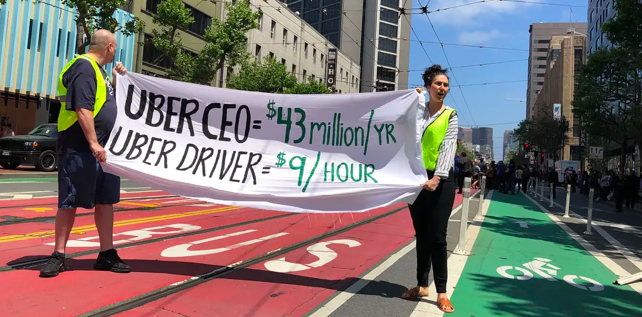California law, under AB-5, states that “companies must prove workers are free from company control and perform work outside the usual course of the company’s business in order to classify workers as independent contractors rather than employees.”- Sara O’Brien.
By Daniel Betancourt/ OptionsSwing Inc August 26, 2020
Uber and Lyft buy themselves more time
On Thursday, Uber and Lyft got their way in court and received their extension to move forward with obliging the law set by AB-5. This is the start of a long legal battle for the two companies if they wish to operate in California, which is among their biggest markets.
The possible shutdown of Uber and Lyft operations would have left hundreds of thousands of drivers without work and many more customers with one less way of getting around. Following litigation presented by prosecutors from Los Angeles, San Francisco, and San Diego back in May, a Supreme Court Judge created an order last week which Uber and Lyft would have to adhere to by this September. The short timespan given to Uber and Lyft forced them to threaten to shut down their services because they said the time given is not nearly enough to make the transition.
What is AB-5 and how does it affect current contractors?
Assembly Bill 5 makes it difficult for the companies to claim workers as contractors rather than employees. It claims that these “gig workers” should have access to labor protection and benefits such as employer-sponsored health insurance, overtime pay, and paid sick leave, which they do not currently receive as independent contractors. Here is what a current long time Lyft driver has to say about the situation:
“A slippery slope is what it is. It can set a precedent, but at what cost? In a situation like this there are truly no winners. At least not the majority of workers that prefer the flexibility of the job. The law doesn’t discriminate though. I guess at the core of the debate is what are Lyft and Uber really? Are they truly companies that operate for independent contractors? Who also gets to set their own rates as traditional independent contractors do? Did they become so big a monopoly on the rideshare business that they had to be regulated? That’s up for debate. But are they willing to reconstruct their business model?”-Carlos M. Ayala.
That is a good question, are Uber and Lyft willing to reconstruct their current model? The current model where they are not responsible for minimum wage, reimbursement on expenses, and sick leave pay. Instead, they leave it in the hands of taxpayers while they pocket a pretty penny. The CEO’s follow up with saying that in order to comply with the law, they would have to cut the workforce, raise prices, have longer wait times, and decrease the quality of work. This pandemic has taken quite a toll on their financial strength which forced them to remove many corporate positions. Drivers alike are divided when it comes to “for or against” this bill. Many say they want to keep the flexible work schedules that the independent contractor status allows, which the companies say they may not be able to maintain if they convert drivers to employees. The other half wants the benefits for employees that AB-5 provides.
Bottom line is it looks like it will not come down to the courts to decide the faith of these companies. Come November, the decision will be made in the voting polls; “Proposition 22 would consider app-based drivers to be independent contractors and not employees or agents. Therefore, the ballot measure would override Assembly Bill 5 (AB 5), signed in September 2019, on the question of whether app-based drivers are employees or independent contractors.”[1]
What do shareholders want to see?
Well the obvious answer is that shareholders want to see all services continue. The news of a possible shutdown sent Uber and Lyft downhill for a week only to make somewhat of a recovery when they received their appeal a few days later. Board members need to do whatever it takes to buy themselves more time and wait for a vote on Prop 22. They stand a better chance with the citizens than they do with a Judge.
[1] California Attorney General, “Initiative 19-0026,” October 29, 2019

